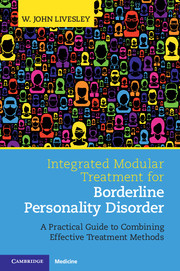 Integrated Modular Treatment for Borderline Personality Disorder
Integrated Modular Treatment for Borderline Personality Disorder Book contents
- Frontmatter
- Dedication
- Contents
- Preface
- Section 1 Introduction and Framework for Understanding Borderline Personality Disorder
- Section 2 Assessment and Treatment Planning
- Section 3 General Treatment Modules
- Introduction
- 7 General Treatment Module 1: Structure
- 8 General Treatment Module 2: Treatment Relationship
- 9 General Treatment Module 3: Consistency 101ment Module 3: Consistency
- 10 General Treatment Module 4: Validation
- 11 General Treatment Module 5: Self-Reflection
- 12 General Treatment Module 6: Motivation
- Section 4 Safety, Containment, and Engagement: The Initial Phase of Treatment
- Section 5 Improving Emotional Regulation and Modulation
- Section 6 Exploration and Change: Treating Interpersonal Problems
- Section 7 Constructing an Adaptive Sense of Self
- Section 8 Retrospect and Prospect
- References
- Index
10 - General Treatment Module 4: Validation
from Section 3 - General Treatment Modules
Published online by Cambridge University Press: 16 February 2017
- Frontmatter
- Dedication
- Contents
- Preface
- Section 1 Introduction and Framework for Understanding Borderline Personality Disorder
- Section 2 Assessment and Treatment Planning
- Section 3 General Treatment Modules
- Introduction
- 7 General Treatment Module 1: Structure
- 8 General Treatment Module 2: Treatment Relationship
- 9 General Treatment Module 3: Consistency 101ment Module 3: Consistency
- 10 General Treatment Module 4: Validation
- 11 General Treatment Module 5: Self-Reflection
- 12 General Treatment Module 6: Motivation
- Section 4 Safety, Containment, and Engagement: The Initial Phase of Treatment
- Section 5 Improving Emotional Regulation and Modulation
- Section 6 Exploration and Change: Treating Interpersonal Problems
- Section 7 Constructing an Adaptive Sense of Self
- Section 8 Retrospect and Prospect
- References
- Index
Summary
Most therapies concur that validation has a crucial role in treating borderline personality disorder (BPD) and that it forms an essential ingredient of a supportive and empathic stance. Validation refers to the therapist's recognition, acknowledgement, and affirmation of the legitimacy of the patient's experience. Essentially, validating interventions affirm the therapist's empathic understanding and acceptance of the patient's mental state. The important feature for the patient is having one's subjective experiences understood, a process that creates feelings of safety and trust needed to explore, reflect, understand, and change.
Although validation may be applied to specific emotions, opinions and points of view, and behaviours, it also refers to something more general – the therapist's affirmation of the patient as a person. This includes affirming the patient's strengths and successes, something that is readily overlooked with a purely problem-focused approach.
Functions of Validation
Validation contributes to a treatment process that provides an ongoing corrective experience that helps to restructure maladaptive schemas. It is also an important first step in the change process. Patients need to feel validated before they can work on making changes. This is seen with deliberate self-harm. Many patients have been criticized previously for engaging in this behaviour and hence they need the therapist's non-judgemental approach to feel secure enough to make the effort to change. Indications of acceptance are liberating: they reduce rigidity and the need to spend time justifying actions.
Validation is also central to managing core self and interpersonal pathology. It helps to correct the empathic failures that compromised the development of the self as knower and counters self-invalidating thinking. Experience of a validating relationship contributes to building new expectations about relationships and correcting distorted perceptions and interpersonal distrust. Perhaps most importantly, consistent validation builds trust in oneself as an authentic and autonomous individual and confidence in one's ability to differentiate social communications that are genuine and trustworthy from those that are not.
- Type
- Chapter
- Information
- Integrated Modular Treatment for Borderline Personality DisorderA Practical Guide to Combining Effective Treatment Methods, pp. 109 - 115Publisher: Cambridge University PressPrint publication year: 2017


